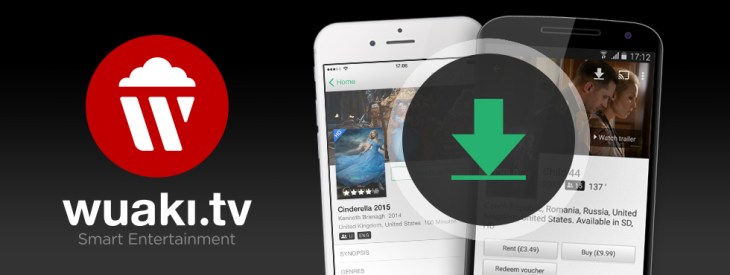While Netflix has remained firm in its stance against offline downloads of its streaming video catalog, one of its competitors in Europe has jumped ahead of it with its own offering. Wuaki.tv, the online video service owned by Japan’s Rakuten, is launching an offline feature across its European footprint, where its users — currently numbering around 3 million — will be able to take any on-demand film or TV show and download it to their device to watch when they’re not connected to the Internet.
Wuaki’s global product director Sidharth Jayant tells TechCrunch that initially the feature will be available on iOS and selected Android devices, with the aim of adding more extended mobile support and then eventually considering desktop and other viewing options.
“At this point the idea is primarily for mobile phones and adding mobility to the on demand experience,” he said. “You don’t have to be stuck in a particular place to watch something now. We’re targeting that first before considering other situations.”
Wuaki also works over gaming consoles, Chromecast and Smart TVs, in addition to smartphones, laptops and desktop computers. The aim here is also to help drive up the number of people using its service overall but especially on mobile, where the company says it currently only has half a million users out of its 3 million total.
Wuaki’s move comes in the same month that Amazon also announced that it would start to offer offline downloads of content from its Prime Instant Video service, starting first in the U.S., UK, Germany and Austria. Wuaki’s offer will apply in the five markets where it is currently active — the UK, France, Germany, Italy and Spain — along with the two extra markets where it will be launching services in October, Austria and Ireland.
Accessing the on-demand feature will not come at any extra cost to current users of its VOD service; but those who take its subscription service — available in Spain only — will not be able to use it. This effectively will mean that some 90 percent of Wuaki’s total catalog will be accessible for offline downloads.
Wuaki says that while the downloaded content will be usable for as long as you are a Wuaki user, once you de-register, it will no longer be accessible.
Netflix has come under some criticism for its longstanding stance against offline viewing, in particular because it acknowledges that a lot of customers request it and so there seems to be a clear enough demand to have the option.
Comments made by a Netflix executive earlier this month indicated that offering a download option alongside the streaming that people have come to know and use would likely take away from the user experience.
“I think it’s something that lots of people ask for. We’ll see if it’s something lots of people will use,” Neil Hunt, Netflix’s Chief Product Officer, told Gizmodo. “Undoubtedly it adds considerable complexity to your life,” he added in reference to Amazon’s move to offer downloaded video, announced only days earlier.
There are of course some catches to a download service. The most obvious of these centers on mobile devices. A user will need enough storage space on his/her device in order to get the content on there in the first place.
Wuaki estimates that the average film will be 1.3 gigabytes and a TV show will be around 800 megabytes, and users won’t be warned ahead of the download if they lack enough space on their devices before downloading, just told how big the file will be.
Given that the limited storage space of mobile devices was arguably what propelled the streaming industry forward to begin with, it seems almost retro to consider that now people are asking for — and are being given — a way of stepping back to an older consumption format.
Asked if Wuaki was working on ways of either compressing that video down even more, or caching in a way that took up less space, à la music companies that allow for offline listening, Jayant would not comment.
In contrast, Netflix appears instead to be focusing on ways of transferring the Netflix experience, or a slice of it, to places where there may not be Internet connectivity but you may want to use the service anyway — for example, by way of a special deal with planes where they hold a Netflix video box on board that your tablet or other device can access for content.
